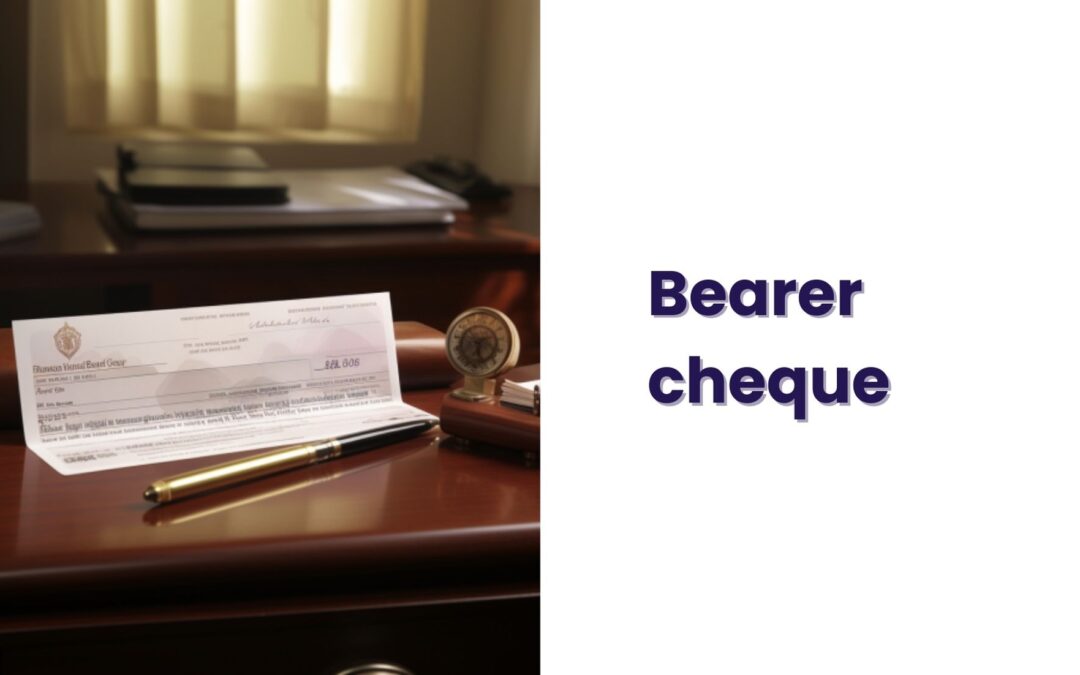Ever heard of a bearer cheque and wondered about its significance in the Indian financial landscape? Let’s unravel its mysteries, especially within the Indian context.
Introduction to Bearer Cheque
In the vast tapestry of India’s financial history, these cheques emerge as a unique and intriguing component. While modern payment methods dominate the landscape, understanding the nuances of such cheques remains pivotal. This article delves deep into the world of such cheques, shedding light on their historical significance, operational mechanics, advantages, challenges, and legal frameworks within the Indian context.
Whether you’re navigating India’s diverse financial ecosystem or simply curious about traditional payment instruments, join us on this enlightening journey to uncover the mysteries of these cheques in modern-day India.
On a side note, do you want to save your money in 24k digital gold? Download the Jar App and start saving now.
What is a Bearer Cheque in India?
In India, such a cheque is a unique financial instrument that stands apart from regular cheques. Unlike cheques that specify a payee, these cheques are payable to the individual who physically possesses them. This means if you’re holding one, you can march into an Indian bank and encash it without the need for additional endorsements.
History and Evolution of Bearer Cheques in India
These cheques have a rich legacy in India, tracing back to colonial times and the subsequent evolution of the Indian banking system post-independence. Historically, they played a pivotal role in facilitating trade and financial transactions, witnessing shifts in regulations and acceptance over the decades.
How Bearer Cheques Operate in the Indian Context
The functioning of these cheques in India hinges on simplicity. Once issued, these cheques become negotiable instruments, granting cash access to whoever holds them. This straightforwardness has made them a subject of both preference and caution among Indians.
Advantages of Bearer Cheques in India
Convenience in Indian Transactions
These cheques offer unparalleled convenience in the Indian financial milieu. Their straightforward nature streamlines transactions, proving beneficial in scenarios demanding immediate liquidity.
Anonymity and its Relevance in India
Given India’s diverse financial landscape, the anonymity provided by such cheques holds relevance. They facilitate discreet transactions, aligning with cultural and business nuances prevalent in certain sectors.
Disadvantages of Bearer Cheques in the Indian Financial System
Security Concerns in India
While these cheques offer advantages, they come with inherent security risks. In India’s rapidly digitizing financial ecosystem, concerns regarding loss, theft, and unauthorized usage loom large.
Limited Acceptance in Modern India
With digital payment solutions gaining momentum, many Indian institutions and businesses have restricted or ceased accepting these cheques due to associated risks and evolving regulatory norms.
Legal Framework Governing Bearer Cheques in India
Navigating the realm of such cheques in India necessitates an understanding of the prevailing legal frameworks. The Reserve Bank of India (RBI) and other regulatory bodies have instituted guidelines to govern their issuance, usage, and protection. Staying abreast of these regulations ensures compliance and safeguards against potential legal repercussions.
Alternatives to Bearer Cheques in the Indian Market
Given the evolving financial landscape in India, several alternatives to these cheques have emerged. Electronic fund transfers, online banking, Unified Payments Interface (UPI), and other digital payment platforms offer secure, efficient, and traceable alternatives, resonating with contemporary Indian preferences.
While their usage has diminished, bearer cheques continue to find niche applications in India. From rural areas with limited banking infrastructure to specific business transactions requiring immediate cash liquidity, their utility persists. However, discerning individuals and entities weigh the risks against benefits, often opting for safer alternatives.
Conclusion
Bearer cheques, with their historical significance and nuanced characteristics, provide invaluable insights into India’s financial evolution. As the nation progresses towards a digital-first economy, understanding their legacy and limitations remains essential for informed decision-making.
FAQs
Are bearer cheques widely accepted in India today?
While these cheques have historical significance, their acceptance has waned due to security concerns and the rise of digital payment solutions in India.
What are the primary security risks associated with bearer cheques in India?
The main risks encompass loss, theft, unauthorized usage, and potential financial fraud, highlighting the need for caution and vigilance.
How do bearer cheques align with India’s digital payment revolution?
While these cheques offer a traditional payment method, they contrast sharply with India’s digital-first approach, prompting many to explore safer and more efficient alternatives.
Are there specific regulations governing bearer cheques in India?
Absolutely. The Reserve Bank of India (RBI) and other regulatory bodies have instituted guidelines to govern their issuance, usage, and protection, ensuring compliance and consumer protection.
How do bearer cheques cater to specific Indian market segments?
These cheques cater to diverse segments, including rural areas with limited banking infrastructure and specific business transactions requiring immediate liquidity. However, their usage remains niche, with many opting for modern payment alternatives.

